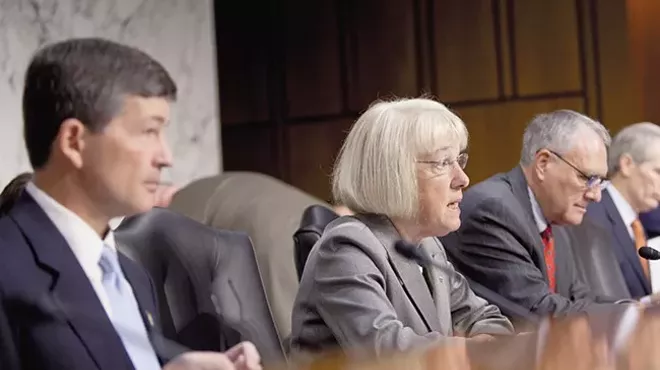While blame over the partial shutdown of the federal government has sent fingers pointing, make no mistake: the Republican-controlled House started it. To keep funding the government, a "continuing resolution" needed to pass both houses of Congress. But every variation of the resolutions from the House came with an extra demand: Defund or delay major pieces of the Affordable Care Act, the health reform package also known as "Obamacare."
The Senate, controlled by Democrats, was unsurprisingly reticent to make huge changes to the president's signature piece of legislation and outright refused to pass the resolution.
But now the question is less "Who started it?" and more "Can anyone end it?" Republicans don't want to walk away from this showdown empty-handed. But Democrats, including Obama, don't want to negotiate until the government starts back up again, saying they're tired of seeing crises used for political leverage.
To understand just how tricky it will be to extract the government from the shutdown, look no further than Idaho and Eastern Washington's senators and representatives.
Cathy McMorris Rodgers: Voice of the GOP establishment
As House Republican Conference chair, Rep. Cathy McMorris Rodgers has been a close ally of Speaker of the House John Boehner. Behind the scenes, national reporting has highlighted serious uncertainty among GOP leadership. But publicly, McMorris Rodgers' message has not wavered. She blames Democrats for refusing to compromise, condemns barricades erected around open-air memorials, highlights Republican attempts to reopen some important parts of the government and criticizes Obamacare.
In a USA Today editorial last week, she used the Spokane region to justify the House's fervent opposition to Obamacare. "No matter where I go when I'm home in Eastern Washington — the grocery store, the local coffee shop, the county fair — the concern is the same: Obamacare is making life harder for everyday Americans," she wrote. That article earned her pushback — the Seattle Times dedicated a story last week to McMorris Rodgers' constituents who'd been bothered by her rhetoric. But to the Inlander, McMorris Rodgers maintains Obamacare has been "overwhelmingly" opposed locally.
She argues that tying government funding to a one-year delay in the individual mandate (requiring everyone to have insurance) is perfectly reasonable — after all, Obama had already delayed the mandate for employers.
Ending the shutdown "starts with getting to the table and starting to talk," McMorris Rodgers says. Democrats say they're more than willing to negotiate if Republicans pass a "clean" continuing resolution without any extra baggage, but McMorris Rodgers isn't biting.
"'I give you everything you want and then you're going to start talking to me?' That's not a negotiation," McMorris Rodgers says. "It's outrageous — it's 'either my way or the highway.'"
Raul Labrador: The GOP Hardliner
"I've been, for two months, leading the charge to making sure that we could delay Obamacare for a year," says Idaho Rep. Raul Labrador. "The law's not ready for prime time."
After Labrador was elected in 2010, he clashed with Boehner, accusing him of "abandoning" conservatives. In January, Labrador helped organize opposition to Boehner's re-election as speaker. He's criticized Boehner for being too willing to buckle under pressure, too quick to give up a good hand by folding.
But lately, Labrador has been proud of Boehner's ability to stand his ground. "I think he's done a very good job with this," Labrador says.
Many congressional reporters argue the ground Boehner has to stand on is limited, precisely because of Republicans like Labrador. If he folds now, National Review's Robert Costa reports, Boehner risks angering hardliners, further complicating negotiations for the upcoming debt limit.
"The insurgents are now his palace guards," the Washington Post wrote, describing how powerful the far right has become. After the shutdown, the New York Times cited Labrador as one of a small group of hardliners who "outflanked" House leadership. Labrador was among the first dozen House Republicans to sign onto a letter in August encouraging Boehner to refuse to fund Obamacare in the continuing resolution.
But in this fight, Labrador sees Republican unity, not division: "How could a small group of conservatives tie [Boehner's] hands? We have a majority of the conference with us. When leadership has been following a more conservative position, and listening to us as conservatives, we've had a more unified conference," he says. "The irony's that it's the ones who don't want to fight that find themselves in the minority."
Mike Simpson: The Moderate
Labrador's eastern neighbor Mike Simpson, meanwhile, was making headlines for a different reason: A comment to a Roll Call reporter earned him a spot on the Washington Post's tally of approximately 22 Republican moderates supposedly willing to pass a clean continuing resolution to fund the government.
He's proof of what a moderate image gets you in Idaho: A primary opponent, funded by the Club for Growth. "Congressman Mike Simpson is showing his true colors as a leader today," Simpson's opponent Bryan Smith says in a press release. "He is willing to cave to Senator Harry Reid and President Obama instead of standing up and fighting for the people of Idaho."
Simpson took to his website to clarify: "Let me be clear, I am going to continue to support the position of our Republican Caucus in the ongoing shutdown dispute," he said, explaining he'd be willing to support passing a clean resolution, but only a very short and temporary one. Such hedging calls into questions claims there are enough supportive Republicans in the House to successfully pass a clean continuing resolution.
So far, the question is purely academic: Boehner has not been willing to even allow a vote on the issue.
Patty Murray: The Budget Boss
In the Democratic-controlled Senate, meanwhile, Washington Sen. Patty Murray, chair of the Senate Budget Committee, could be crucial to a deal to end the shutdown.
Republicans have pointed to unofficial talks between Murray and House Budget Committee Chair Paul Ryan as a possible path through the shutdown crisis. But when Boehner repeatedly mentioned those talks in conversations with President Obama, Senate Majority Leader Harry Reid laughed.
"I couldn't take it any longer. I said: 'Stop it. They've met a few times and talked about nothing,'" Reid said, according to the New York Times. "The meetings were only for you, for show."
This year, Murray eliminated a longtime Republican talking point by passing a Senate budget for the first time in four years. No surprise: It was much more liberal than Ryan's budget in the House. But on 19 occasions during the past six months, Democrats have asked Republicans for a conference committee to hammer out the differences between the two budgets. If they'd been able to agree on a full budget, the government shutdown wouldn't have happened.
The intention of the talks between Ryan and Murray, Murray spokesman Matt McAlvanah says, was merely to get the parties to the conference committee table. "Since Republicans have been unwilling to do that, those conversations have in fact been less than productive to this point."
Republicans have refused to meet, calling for preconditions. "Until Senator Murray is willing to address the spending [reductions put into place with the] Budget Control Act, we haven't been willing to go to the table," McMorris Rodgers says.
Now that Republicans say they want budget negotiations, Murray and Senate Democrats say they aren't willing to hold those negotiations until the government shutdown ends. "It's allowing yourself to be negotiated with a gun to your head — either you do this, or we tank the economy," McAlvanah says. "That's not the kind of negotiating tactic that Senator Murray is willing to do. ... A lot of what she's doing is making a stand against that type of governing by crisis."
So far, neither side shows signs of budging. And the stakes are about to get higher than closed national parks, shuttered offices and furloughed federal workers. Next Thursday, the United States will hit its debt limit ceiling yet again. If Congress can't agree to raise it, the economic consequences could be disastrous — and far from temporary. ♦





























